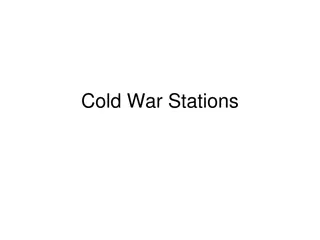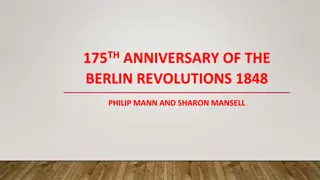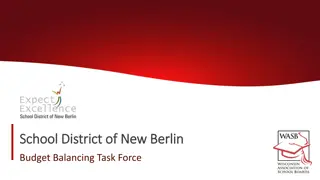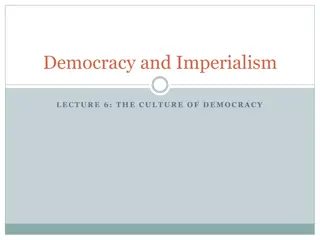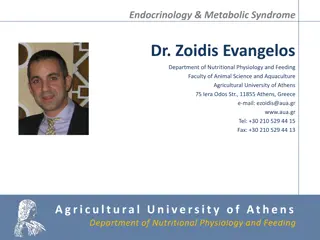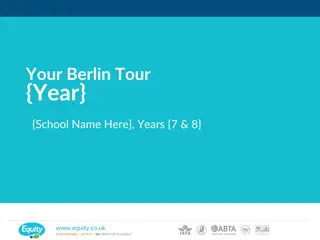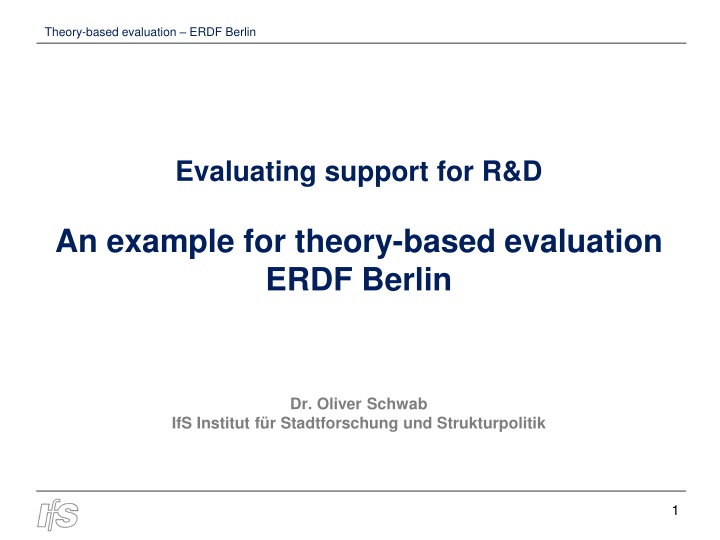
Theory-based Evaluation of ERDF Support for R&D in Berlin
Explore a theory-based evaluation of ERDF support for research and development (R&D) in Berlin, focusing on innovation, investment, and urban development. Dr. Oliver Schwab from IfS Institut für Stadtforschung und Strukturpolitik provides insights into the evaluation design, objectives, and key questions to strengthen innovation capacities in Berlin.
Download Presentation

Please find below an Image/Link to download the presentation.
The content on the website is provided AS IS for your information and personal use only. It may not be sold, licensed, or shared on other websites without obtaining consent from the author. If you encounter any issues during the download, it is possible that the publisher has removed the file from their server.
You are allowed to download the files provided on this website for personal or commercial use, subject to the condition that they are used lawfully. All files are the property of their respective owners.
The content on the website is provided AS IS for your information and personal use only. It may not be sold, licensed, or shared on other websites without obtaining consent from the author.
E N D
Presentation Transcript
Theory-based evaluation ERDF Berlin Evaluating support for R&D An example for theory-based evaluation ERDF Berlin Dr. Oliver Schwab IfS Institut f r Stadtforschung und Strukturpolitik 1
Theory-based evaluation ERDF Berlin The subject PA 1 Innovation 605,687 mio. PA 2 Investment in enterprises start- ups 140,000 mio. ERDF OP Berlin PA CO2-Reduction 243,921mio. PA 4 Integrated Urban Development 230,000 mio. 2
Theory-based evaluation ERDF Berlin Background Innovation System in Berlin Investment in R&D > 3% of GDP Maximum 4% in 2003 Berlin Public Private Germany 0% 20% 40% 60% 80% 100% Reduction of both R&D-expenditure of enterprises and R&D staff in enterprises between 2001 and 2011 3
Theory-based evaluation ERDF Berlin OP Strategy PA 1 Innovation Intensify innovation activities in the economy (R&D, Services, Creative Industries) R&D in enterprises 6 measures 2 of them Infrastructure Creative Industries 2 measures Cluster and Networks 1 measure 4
Theory-based evaluation ERDF Berlin Programme Theory and Evaluation Design Step 3 Developi ng the Evaluati on design Step 1 Step 2 Step 4 Step 5 5
Theory-based evaluation ERDF Berlin Step 3 Developing an evaluation design Main purpose of the evaluation: Grasping effects on R&D-capacities Better understanding of what affects the development of R&D capacities in enterprises in Berlin Evaluation Questions EU-model Contribution to the objective (only 1) Taking context factors into account Strengthening innovation capacity in Berlin Specific situation in Berlin: How to stimulate innovation activities in the economy? Focus the innovation activities of the beneficiaries (enterprises as well as research institutes and universities) 6
Theory-based evaluation ERDF Berlin Step 3 Evaluation Questions On project level Did the project reach it s objectives? Effects for the enterprise? Effects on other enterprises (Spill-overs)? On enterprise level Improved competitiveness? Changes in innovation behaviour? External factors What influenced the innovation process 7
Theory-based evaluation ERDF Berlin Step 3 (preliminary) programme theory (to be translated!) 8
Theory-based evaluation ERDF Berlin Step 3 - Methods Innovation-Biographies new method for analysing knowledge dynamics in innovation processes (Butzin et. al. 2012) Following an innovation process from the first idea to final product/services Case-Studies Document analysis Annual interviews over up to three years Participating observation (seminars, meetings) Network-analysis Cases 19 enterprises 4 universities/research institutes Combined with analysis of data and documents to cover all projects 9
Theory-based evaluation ERDF Berlin Programme Theory and Evaluation Design Step 3 Developing the Evaluation design Step 2 Developing the Evaluation Plan Step 1 Developing the OP- Strategy Step 4 Step 5 10
Theory-based evaluation ERDF Berlin Step 1 Developing the OP-Strategy Crucial Points: Decision to define only one specific objective Intensive discussion with the actors responsible for the measures linking different types of measures to the common specific objective: - Contribution of Infrastructure? - Role of creative industries? First sketch of a coherent story for the PA 11
Theory-based evaluation ERDF Berlin Step 2 Developing the Evaluation Plan Crucial Points Explicit decision for theory-based approaches Literature review for each axis Internal Working Paper Bringing in existing evidence and knowledge First draft of the evaluation concepts Tentative evaluation questions First ideas for evaluation design Establishing the framework for actor involvement Steering Group Training Sessions Outline of the evaluation design embedded in an evaluation system (Communication!) 12
Theory-based evaluation ERDF Berlin Programme Theory and Evaluation Design Step 5 Feed-back and (potential) use of results Step 3 Developing the Evaluation design Step 2 Developing the Evaluation Plan Step 1 Developing the OP- Strategy Step 4 Carrying out the evaluation Steering Group 13
Theory-based evaluation ERDF Berlin Conclusion Programme Theory is (partly) the theory of the programme people Taking into account existing evidence But also the views of programme people Context-sensitive: In how far do general mechanisms apply in a concrete context? TBE: more than testing theoretically justified hypothesis -> Learning about processes and mechanisms TBE: Evaluability depends partly on the programme design 14






